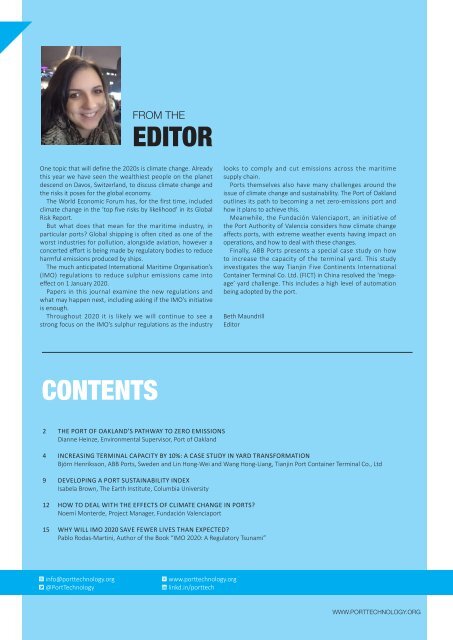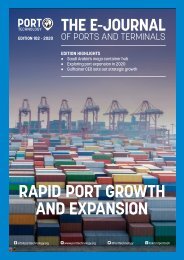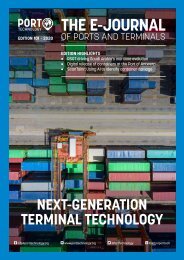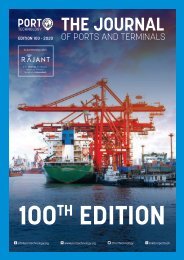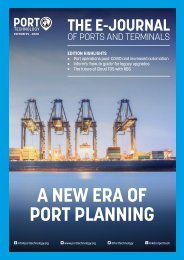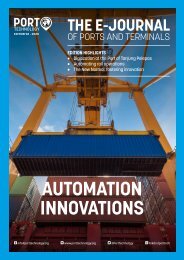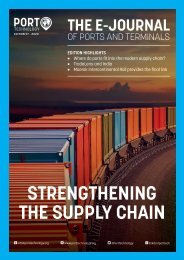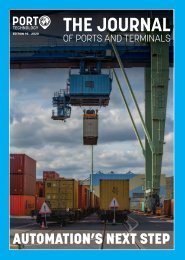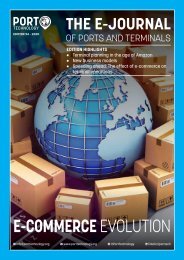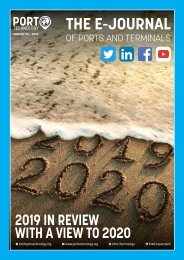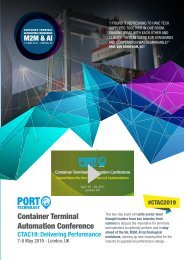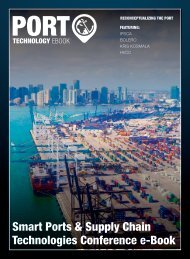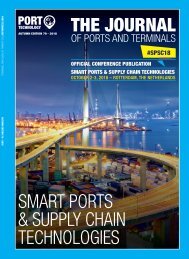A Sustainable Future
Port Technology International’s first e-Journal of 2020 explores the topic of sustainability in ports. Climate change is set to be a defining topic for the 2020s as awareness of its real-time impact is increasing.
Port Technology International’s first e-Journal of 2020 explores the topic of sustainability in ports. Climate change is set to be a defining topic for the 2020s as awareness of its real-time impact is increasing.
You also want an ePaper? Increase the reach of your titles
YUMPU automatically turns print PDFs into web optimized ePapers that Google loves.
5G, MACHINE LEARNING & EXPONENTIAL TECH<br />
FROM THE<br />
EDITOR<br />
One topic that will define the 2020s is climate change. Already<br />
this year we have seen the wealthiest people on the planet<br />
descend on Davos, S witzerland, to discuss climate change and<br />
the risks it poses for the global economy.<br />
The World Economic Forum has, for the first time, included<br />
climate change in the ‘ top five risks by likelihood’ in its Global<br />
R isk R eport.<br />
But what does that mean for the maritime industry, in<br />
particular ports? Global shipping is often cited as one of the<br />
worst industries for pollution, alongside aviation, however a<br />
concerted effort is being made by regulatory bodies to reduce<br />
harmful emissions produced by ships.<br />
The much anticipated International Maritime Organisation’ s<br />
(IMO) regulations to reduce sulphur emissions came into<br />
effect on 1 J anuary 2020.<br />
Papers in this journal examine the new regulations and<br />
what may happen next, including asking if the IMO’ s initiative<br />
is enough.<br />
Throughout 2020 it is likely we will continue to see a<br />
strong focus on the IMO’ s sulphur regulations as the industry<br />
looks to comply and cut emissions across the maritime<br />
supply chain.<br />
Ports themselves also have many challenges around the<br />
issue of climate change and sustainability. The Port of Oakland<br />
outlines its path to becoming a net zero-emissions port and<br />
how it plans to achieve this.<br />
Meanwhile, the Fundación Valenciaport, an initiative of<br />
the Port Authority of Valencia considers how climate change<br />
affects ports, with extreme weather events having impact on<br />
operations, and how to deal with these changes.<br />
Finally, ABB Ports presents a special case study on how<br />
to increase the capacity of the terminal yard. This study<br />
investigates the way Tianjin Five Continents International<br />
Container Terminal Co. Ltd. (FICT) in China resolved the ‘ megaage’<br />
yard challenge. This includes a high level of automation<br />
being adopted by the port.<br />
Beth Maundrill<br />
Editor<br />
CONTENTS<br />
2 THE PORT OF OAKLAND’S PATHWAY TO ZERO EMISSIONS<br />
Dianne Heinze, Environmental S upervisor, Port of Oakland<br />
4 INCREASING TERMINAL CAPACITY BY 10%: A CASE STUDY IN YARD TRANSFORMATION<br />
Bjö rn Henriksson, ABB Ports, S weden and Lin Hong-Wei and Wang Hong-Liang, Tianjin Port Container Terminal Co., Ltd<br />
9 DEVELOPING A PORT SUSTAINABILITY INDEX<br />
Isabela Brown, The Earth Institute, Columbia U niversity<br />
12 HOW TO DEAL WITH THE EFFECTS OF CLIMATE CHANGE IN PORTS?<br />
Noemí Monterde, Project Manager, Fundación Valenciaport<br />
15 WHY WILL IMO 2020 SAVE FEWER LIVES THAN EXPECTED?<br />
Pablo R odas-Martini, Author of the Book “ IMO 2020: A R egulatory Tsunami”<br />
8 info@ porttechnology.org X www.porttechnology.org<br />
T @ PortTechnology l linkd.in/ porttech<br />
1 EDITION 85<br />
WWW.PORTTECHNOLOGY.ORG


